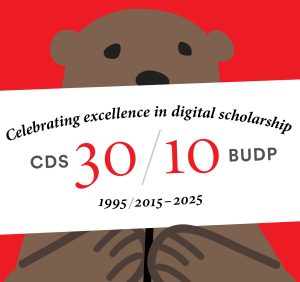
Please join us for the Digital Humanities (DH) Salon! The DH Salon series, hosted by the Center for Digital Scholarship, is a regular, informal presentation series bringing together digital humanities work across the Brown campus. Join us either in the Patrick Ma Digital Scholarship Lab (Room 137) on the first floor of the Rockefeller Library (with lunch!) or on Zoom (https://brown.zoom.us/j/94514112608).
Please register to attend by clicking on the registration links next to the sessions listed below.
DH Salon Schedule
Bengal Ensemble: Portraits in Multiple in the Long Eighteenth Century
Thursday, February 13 at noon – Register
In this session, Margaret Masselli, a Ph.D. student in History of Art and Architecture, will share her research project that seeks to bring together a group of eighteenth-century portraits of political elites in a digital space, in order to ask questions about politics and artistic processes during the rise of the East India Company in Northern India. Her project is part of her work for the Digital Humanities Doctoral Certificate program, and she will share about the process of creating the project as well as her specific research.
In and Out of Place Project
Thursday, February 27 at noon – Register
This presentation will showcase a historical mapping project by Craig Howe from the Center for American Indian Research and Native Studies (CAIRNS) and Lukas Rieppel from Brown. In collaboration with the Center for Digital Scholarship and about half a dozen Brown undergraduate UTRA students for the past year, they produced an interactive GIS story-map to document the spatial history of Lakotan treaty lands and track an infamous military expedition into the Black Hills of South Dakota that took place one hundred and fifty years ago. In addition, they also wrote eleven weekly articles in the Lakota Times newspaper to accompany the digital map, which mine the rich archive of documentary evidence produced during a particular week of that expedition for information about Lakotan history and culture.
The (Hu)man in the Machine: Black Speculative Visions for Technology Beyond Man
Thursday, March 13 at noon – Register
Join us for a presentation by Kristen Reynolds, the International Humanities Postdoctoral Fellow in the Department of Africana Studies, the Center for Digital Scholarship, and the Cogut Institute for the Humanities. She earned her Ph.D. in American studies from the University of Minnesota, Twin Cities in 2024. Her research utilizes Black speculative literature and culture to interrogate how digital and computational technologies reproduce antiblackness through their coherence around Sylvia Wynter’s articulation of “Man, overrepresented as the human.” Her work thereby seeks to demonstrate how Black speculative literature and culture posits new frameworks for developing technologies that promote Black futures. She is interested in teaching courses focused on Black digital humanities and science and technology studies, speculative literature and culture, and courses that allow students to develop and experiment with speculative methods.
The African Poetry Digital Portal
Thursday, April 10 at noon – Register
This session will feature Lorna Dawes, Exploration and Research Librarian Center for Library Exploration and Research, and Kwame Dawes, Professor of Literary Arts, as they share about the African Poetry Digital Portal, a project of the African Poetry Book Fund. The Portal is a resource for the study of the history of African Poetry providing access to biographical information, artifacts, news, video recording, images and documents related to African poetry from antiquity to the present. It will also feature specially curated digital projects on various aspects of African poetry.
Simulating the Garden
Thursday, April 24 at noon – Register
Join us for this presentation by Massimo Riva, Professor and Interim Chair of Italian Studies; Pablo a Marca, Italian Studies graduate student; and Cecilia Marchetti and Stefano Dilorenzo, who will present the theoretical and methodological framework, and hopefully early findings, of a collaborative project involving scholars and doctoral students at Brown, the University of Modena, and the Casa del Boccaccio Foundation in Certaldo, Italy. The project is an exploration of literary gardens with the assistance of foundation models and text-image transformers. Colleagues in Medieval and Early Modern studies as well as colleagues interested in the application of so-called AI tools for research may be particularly interested in this presentation.
